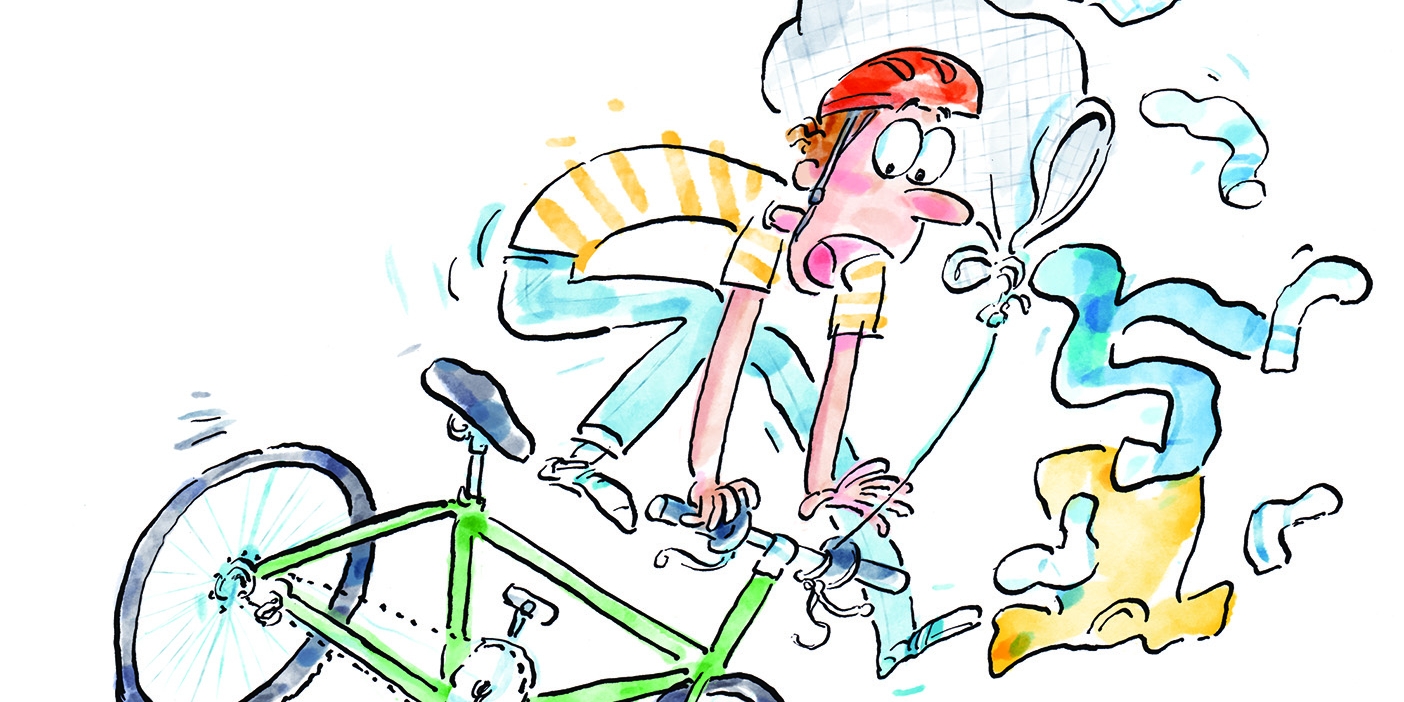Alumni share the decisions that made all the difference when educational paths diverged at the Y.
Weeded
By Tracy Carwin Barrionuevo (BA ’01), Colorado Springs, Colo.
 During my freshman year, I debated between studying humanities and science. My well-meaning brother-in-law suggested I take Chemistry 105 because it filled a general-education requirement and would get me started in any science major. So began my worst class at BYU.
During my freshman year, I debated between studying humanities and science. My well-meaning brother-in-law suggested I take Chemistry 105 because it filled a general-education requirement and would get me started in any science major. So began my worst class at BYU.
I was used to getting good grades, and my performance was disappointing—to say the least. I basically kept my head above water until the final. I studied as best I could and went in praying for a miracle. When I received my test back, I was horrified to see a giant 38 percent at the top! I had apparently failed, and with a capital F! Luckily for me, the class was graded on a most-forgiving curve, and I managed to get out with a B-.
They say some classes are designed to weed out students. I am happy to say I graduated in history teaching with a Spanish teaching minor. Mission accomplished, Chem 105!
Improving the Odds
By Amy Hazzard Hancey (BS ’85), Centerville, Utah
I loved living in the dorms as a freshman. The main topic of late-night conversations was boys—which were available and how to get them to ask us out.
One girl in the group, Janel, always had several dates each weekend. One night I asked what her secret was.
“Well,” she replied, “what’s your major?”
Puzzled, I responded, “I don’t really have one yet. I’m taking GE classes.”
“And what is the ratio of girls to boys in those classes?”
“I don’t know—probably 50/50. Why?”
“I’m majoring in accounting with a mathematics minor. In my calculus class, there are 75 students, and I’m the only girl. In my accounting class of over 200 students, there are two girls in the class. If you want to meet guys, go where the guys are.”
The next semester, I signed up for calculus and physics and declared a math major. Girls who major in early-childhood education have no idea what they are missing.
Go Mom!
By Clarissa Higley Fogelquist (BS ’03), Branson, Mo.
As my husband and I stood beside our son in the newborn ICU, the nurse’s words seemed to resonate loudly in my brain: “Most marriages of parents of children with disabilities don’t make it.” Exhausted and frightened, we stared at each other in shock.
Our son had arrived early, and he spent his first two months in Primary Children’s Medical Center recovering from two brain surgeries and dealing with a long list of health challenges. In school I had been studying advertising and communications, but after our son’s birth, I decided to major in marriage, family, and human development. I worked at my degree part-time between the many surgeries, doctor appointments, and therapy sessions.
My classes were immediately relevant to my life, and I soaked it all in. I loved courses in marriage enhancement, child development and psychology, and more. Wonderful teachers and friends helped me succeed. I gained skills that helped our family and prepared me to support others on similar journeys.
My final semester I enrolled in the course Families in Crisis. Ironically, my son was hospitalized again immediately after classes began. Amid his 17 brain surgeries and complications, I was able to balance schoolwork and graduate on time thanks to the help of sweet classmates.
When I walked into the Marriott Center in cap and gown, I couldn’t hold back my tears. My mom had enlarged pictures of my son, still in the hospital, on huge posters that said, “Way to go, Mom!” and, “I’m so proud of you!” Classmates who had helped me succeed saw the posters and also burst into tears.
The last 11 years, though not the path I thought my life would take, have been a wonderful adventure, strengthened by the education I was blessed to receive at BYU.
Oh No I Won’t!
By Carolyn Bennett Crawford (BS ’58), Pingree, Idaho
It seemed natural to pursue music as I entered BYU. My dad, an untrained, natural musician, desired that his five children become educated in music. I had been given piano lessons early and, during my high school years, was an accompanist for many organizations in the Church.
At BYU I took piano lessons and accompanied string quartets. But toward the end of my sophomore year, I was informed that the music major would require me to play a recital before a jury of music professors.
“Oh no I won’t!” I said. As shy as I was, I knew the experience would be more than I could endure. I immediately declared elementary education as my major and made music my minor.
Chickening out ended up being one of the best decisions I ever made. After graduation, a mission, and marriage, I spent 32 glorious years in the classroom—sandwiched between rearing our six children and teaching piano in our home. I also taught a children’s after-school choir for 24 years.
Being in a classroom of children, watching them learn, and sharing their joys as they matured and had children of their own—whom I also taught—is something for which I’ll be forever grateful.
Today I am our stake music chairman.
Seminary Dropout
By William E. Hill (BS ’87), Idaho Falls, Idaho
In high school I dreamed of being a seminary teacher. I told everyone I was going to be a seminary teacher. When I came to BYU, I figured a psychology degree would get me there, so I took psychology courses. During my senior year, I started on the track to be a seminary teacher.
 I thoroughly enjoyed Brother Rand H. Packer’s (BS ’70, MA ’75) Introduction to Seminary Teaching course. Toward the end of the semester, we could either teach a real seminary class for three days or read a lame book about parenting. I, of course, opted for the teaching and couldn’t have been more excited.
I thoroughly enjoyed Brother Rand H. Packer’s (BS ’70, MA ’75) Introduction to Seminary Teaching course. Toward the end of the semester, we could either teach a real seminary class for three days or read a lame book about parenting. I, of course, opted for the teaching and couldn’t have been more excited.
My assignment was to teach the Orem Junior High ninth graders. I prepared and studied—even practiced in front of the mirror. I had a great floor show that included a Beatles song, a talk by Elder Marvin J. Ashton, and a demonstration of how oil and water don’t mix.
The first day, I stood up and charged through the material in front of the most uninterested group of adolescent scholars I had ever seen. I couldn’t drag even the simplest answers out of them.
It was a bust.
The next day I told Brother Packer that seminary teaching wasn’t for me, bought some comfort food (potato chips), and read a book about parenting.
From Tech to Teach
By Karly Kendall Salisbury (BS ’05), Lindon, Utah
When I first came to BYU, I studied computer science. I could hold my own with any of the guys, and I liked the problem solving it involved. I also liked that it was a challenge and that everybody’s response to my major was “Whoa, you must be smart.”
During that time, I had a job at a dry cleaner. My boss’s children came to the store after school, and I soon started helping them with their math homework. My boss noticed and began doing my work while I helped his kids in the back. We eventually moved tutoring to their house during off hours. The work was hard, and I was new to it. But I loved the subject, and I wanted them to learn.
One day I was teaching the daughter a difficult concept that we had discussed about a million times. But on that day she understood. She actually got it. She was almost as excited as I was.
That changed me. On that day I learned that I could find satisfaction in teaching. I made my major elementary education. After that, the reaction to my major was often “Oh, that’s cute,” but I just smiled. Because of my experiences in tutoring, I knew it was important work, and it was the right thing for me to do.









